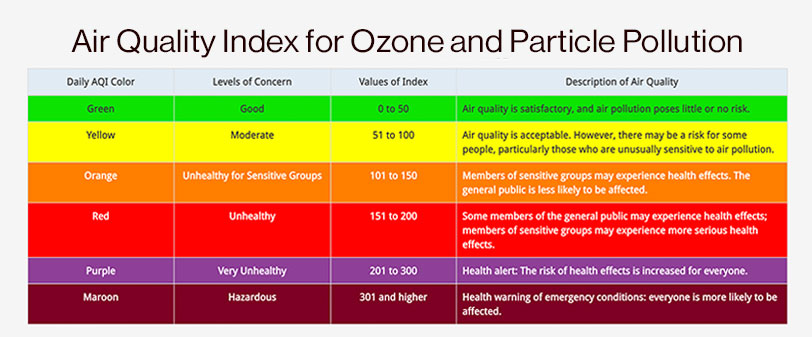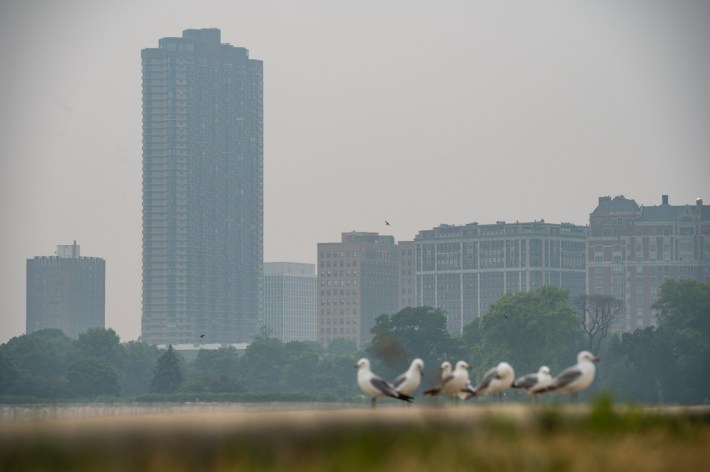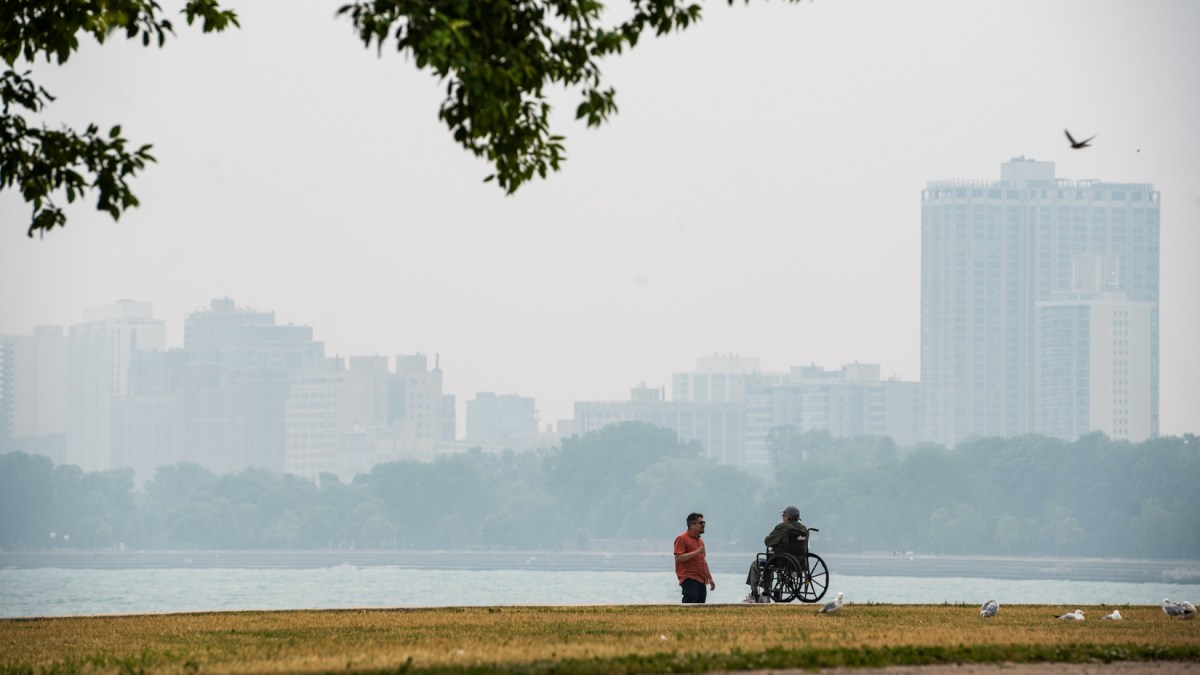CHICAGO — Chicago's air quality is plummeting thanks to Canadian wildfire smoke pouring into our atmosphere.
The
World Air Quality Index ranked Chicago as the worst for air quality among major cities, with Minneapolis, Dubai, Detroit and Delhi rounding out the top five. Chicago's air is labeled an "unhealthy" 200 by the index.

The National Weather Service blamed the conditions and low visibility on the wildfire smoke that has wafted down from Canada and impacted large regions of the United States. The service suggested limiting prolonged outdoor activities.
Argonne National Laboratory atmospheric scientist Scott Collis said wildfire smoke has also been trapped in the Chicago area by what's known as an atmospheric inversion, where temperatures increase in the atmosphere.
"What that does is, it puts a cap on the atmosphere. It means that it makes it very difficult for smoke to rise, so a lot of that wildfire smoke got trapped under that inversion that actually caused this," Collis said. "If I look out my window right now, you'd swear that it was overcast, but there are actually no clouds above us right now. That's all smoke."
Around 12 p.m. Tuesday, Collis said Chicago is likely at or near the peak of the worst air quality readings, for now. He expects conditions to improve gradually over the next 24 hours.
But as long as wildfires keep burning in Ontario and Quebec, Chicago will likely be hit with smoky skies again, he said.
"The real question is, how long until we get our next storm system that comes through that brings the winds back around from Canada?" he said. "So long term, what we need is for those wildfires to go away, because this is just going to keep happening in a cyclical fashion as we start to get our winds from the north and northwest again."
 Credit: Colin Boyle/Block Club Chicago
Credit: Colin Boyle/Block Club Chicago The Chicago skyline was not visible south of Diversey Avenue as air quality reached reached very unhealthy levels, as seen from Montrose Harbor in Uptown on June 27, 2023.
Chicago Public Schools said in an email to families Tuesday it would move its summer programs indoors "to reduce the risk to students and staff."
Mayor Brandon Johnson also issued a statement saying the city is monitoring the situation and urging children, teens, seniors, people with heart or lung disease and pregnant people to avoid strenuous activities and limit time outdoors.
"For additional precautions, all Chicagoans may also consider wearing masks, limiting their outdoor exposure, moving activities indoors, running air purifiers and closing windows," the statement reads. "As these unsafe conditions continue, the City will continue to provide updates and take swift action to ensure that vulnerable individuals have the resources they need to protect themselves and their families. Anyone who needs immediate medical attention should dial 911."
Residents can check
airnow.gov to keep track of the air quality throughout the day.
- Avoid exercising outdoors and stay inside with windows closed and air conditioning on if possible.
- Avoid driving your car if possible, as auto use contributes to poor air quality.
- Don't smoke.
- If you must be outside, consider wearing an N95 or KN95 mask. Surgical masks will not be helpful with air pollution, according to Mount Sinai Health.
Dr. Ravi Kalhan, a pulmonologist at Northwestern Medicine, agreed people should avoid outdoor exercise and other activities Tuesday. He said those with asthma should "absolutely" wear a KN95 mask outside, if possible.
"An AQI of 20, if you were outside all day, is very close to smoking one cigarette a day. So an AQI of 200-ish, if you spent the whole day outside, is equivalent to smoking 10 cigarettes," he said.
Chicago's Air Quality Index was 187 at 1 p.m. Tuesday.
Kalhan said on top of keeping windows closed, people can also keep their HVAC system running — if it has a high quality filter — to clean the air in their homes.
"If they have a central HVAC system with a central filter, and that filter is a high quality filter in the range of MERV eight to 13, it's probably best to run the HVAC fan, so the air gets cleaned continuously with the windows closed," he said. "If people don't have central air and can afford a portable air purifier with a HEPA filter, running that indoors with the windows closed is best practice."
While Tuesday's bad air quality is harmful to vulnerable populations, the single-day event should be manageable for most people, Kalhan said. But the long term ramifications are more concerning, and could lead to "a big public health problem," he said.
"Kids can't stay inside every day, right? That's not a possibility. And if our youth are continuously exposed to the equivalent of five to 10 cigarettes a day from the day they're born till the day they're 40, there's a chronic health risk associated with that," he said. "We need to confront it in the big picture through that lens, that the more often we have these days, the greater the threat there is to the long term public health."
 The National Weather Service blamed the conditions and low visibility on the wildfire smoke that has wafted down from Canada and impacted large regions of the United States. The service suggested limiting prolonged outdoor activities.Argonne National Laboratory atmospheric scientist Scott Collis said wildfire smoke has also been trapped in the Chicago area by what's known as an atmospheric inversion, where temperatures increase in the atmosphere."What that does is, it puts a cap on the atmosphere. It means that it makes it very difficult for smoke to rise, so a lot of that wildfire smoke got trapped under that inversion that actually caused this," Collis said. "If I look out my window right now, you'd swear that it was overcast, but there are actually no clouds above us right now. That's all smoke."Around 12 p.m. Tuesday, Collis said Chicago is likely at or near the peak of the worst air quality readings, for now. He expects conditions to improve gradually over the next 24 hours.But as long as wildfires keep burning in Ontario and Quebec, Chicago will likely be hit with smoky skies again, he said."The real question is, how long until we get our next storm system that comes through that brings the winds back around from Canada?" he said. "So long term, what we need is for those wildfires to go away, because this is just going to keep happening in a cyclical fashion as we start to get our winds from the north and northwest again."
The National Weather Service blamed the conditions and low visibility on the wildfire smoke that has wafted down from Canada and impacted large regions of the United States. The service suggested limiting prolonged outdoor activities.Argonne National Laboratory atmospheric scientist Scott Collis said wildfire smoke has also been trapped in the Chicago area by what's known as an atmospheric inversion, where temperatures increase in the atmosphere."What that does is, it puts a cap on the atmosphere. It means that it makes it very difficult for smoke to rise, so a lot of that wildfire smoke got trapped under that inversion that actually caused this," Collis said. "If I look out my window right now, you'd swear that it was overcast, but there are actually no clouds above us right now. That's all smoke."Around 12 p.m. Tuesday, Collis said Chicago is likely at or near the peak of the worst air quality readings, for now. He expects conditions to improve gradually over the next 24 hours.But as long as wildfires keep burning in Ontario and Quebec, Chicago will likely be hit with smoky skies again, he said."The real question is, how long until we get our next storm system that comes through that brings the winds back around from Canada?" he said. "So long term, what we need is for those wildfires to go away, because this is just going to keep happening in a cyclical fashion as we start to get our winds from the north and northwest again."Credit: Colin Boyle/Block Club Chicago The Chicago skyline was not visible south of Diversey Avenue as air quality reached reached very unhealthy levels, as seen from Montrose Harbor in Uptown on June 27, 2023.
Chicago Public Schools said in an email to families Tuesday it would move its summer programs indoors "to reduce the risk to students and staff."Mayor Brandon Johnson also issued a statement saying the city is monitoring the situation and urging children, teens, seniors, people with heart or lung disease and pregnant people to avoid strenuous activities and limit time outdoors."For additional precautions, all Chicagoans may also consider wearing masks, limiting their outdoor exposure, moving activities indoors, running air purifiers and closing windows," the statement reads. "As these unsafe conditions continue, the City will continue to provide updates and take swift action to ensure that vulnerable individuals have the resources they need to protect themselves and their families. Anyone who needs immediate medical attention should dial 911."Residents can check airnow.gov to keep track of the air quality throughout the day.The American Lung Association and Mount Sinai Health System shared the following tips for those looking to limit exposure to unhealthy air:


No comments:
Post a Comment